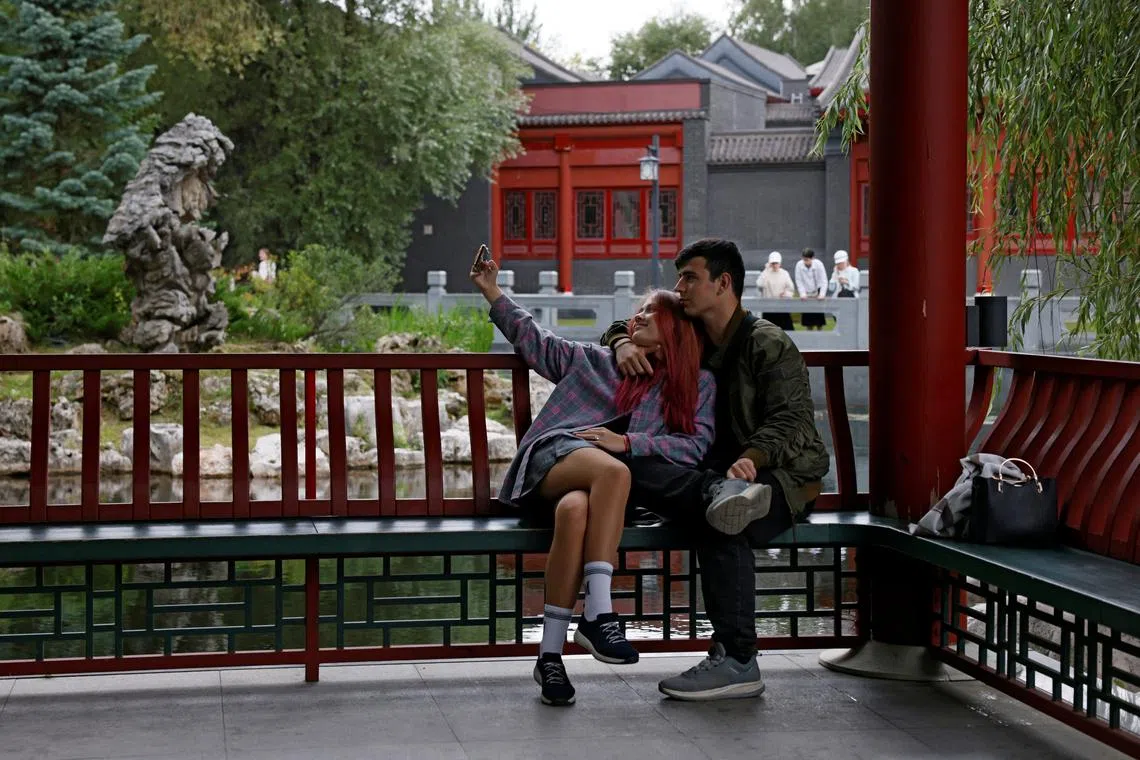Signs of Chinese influence abound in Moscow before Putin’s Beijing visit
Sign up now: Get ST's newsletters delivered to your inbox

People taking a photo in the Chinese landscape park in Moscow, Russia, on Aug 19.
PHOTO: REUTERS
Follow topic:
MOSCOW – From a Chinese business centre near a park featuring traditional Chinese pavilions, to Russian adults learning Mandarin and practising gongfu, and sizzling dishes being served in Chinese restaurants and car showrooms displaying Chinese vehicles – as Russian President Vladimir Putin prepares for a visit to China next week, signs of Beijing’s influence in the Moscow abound.
“It seems that the contacts with China are intensifying. A mutual interest is growing,” said Ms Natalia Gerasimova, a manager at a Russian company and a visitor to Moscow’s Chinese landscape park who said she had visited Beijing in April.
“They are open to us, they treat us well. So in Russia, I do not see any resistance to these relations either. Yes, we have different mentalities, but we are alike in some ways”.
When Western countries cut ties with Russia after it sent tens of thousands of troops into Ukraine in 2022, China helped Moscow by buying Russian oil and selling goods – from cars to electronics – that pushed bilateral trade to a record US$245 billion (S$315 billion) in 2024.
Mr Putin and Chinese President Xi Jinping signed a “no limits” partnership in 2022.
But although China remains Russia’s biggest trading partner, trade turnover with China has fallen in 2025, a trend that Mr Putin will seek to reverse at his summit with Mr Xi, three Russian sources told Reuters.
Evidence of Chinese influence in Moscow is hard to miss.
The Chinese flag flies at a Chinese business centre in north-eastern Moscow and people stroll through the nearby landscape park beneath ornate Chinese pavilions.
‘Pragmatism’
Some Russians say the close ties are pragmatic, with China acting primarily in its own interests.
“China is about industry, about the labour market, but it is not about technologies. Technologies always come from the West – from the US, from Europe,” said Mr Roman Dmitriev, a businessman and visitor to the landscape park.
“So, as soon as the West reopens to us, we will switch back. And it will be a logical step. (But) for now, China is our booster. We can compare it with an athletic friend in school who can defend and fight for you.”
At Moscow’s “Chinese First” language school, Ms Natalia Wang, the director, said demand from children and adults to learn Chinese had grown suddenly.
“It was like a switch was flicked. One day, the applications (to study Chinese) started pouring in,” she said.
Chinese-made cars are now a common sight in Moscow.
Mr Valery Bondarenko, a pensioner visiting the showroom of Moscow’s Peleton car dealership, said Chinese cars had come on “in leaps and bounds” but some Russians remained sceptical.
“They face our consumer conservatism,” he said. “We still believe German or Japanese cars guarantee 100 per cent quality and safety.” REUTERS

